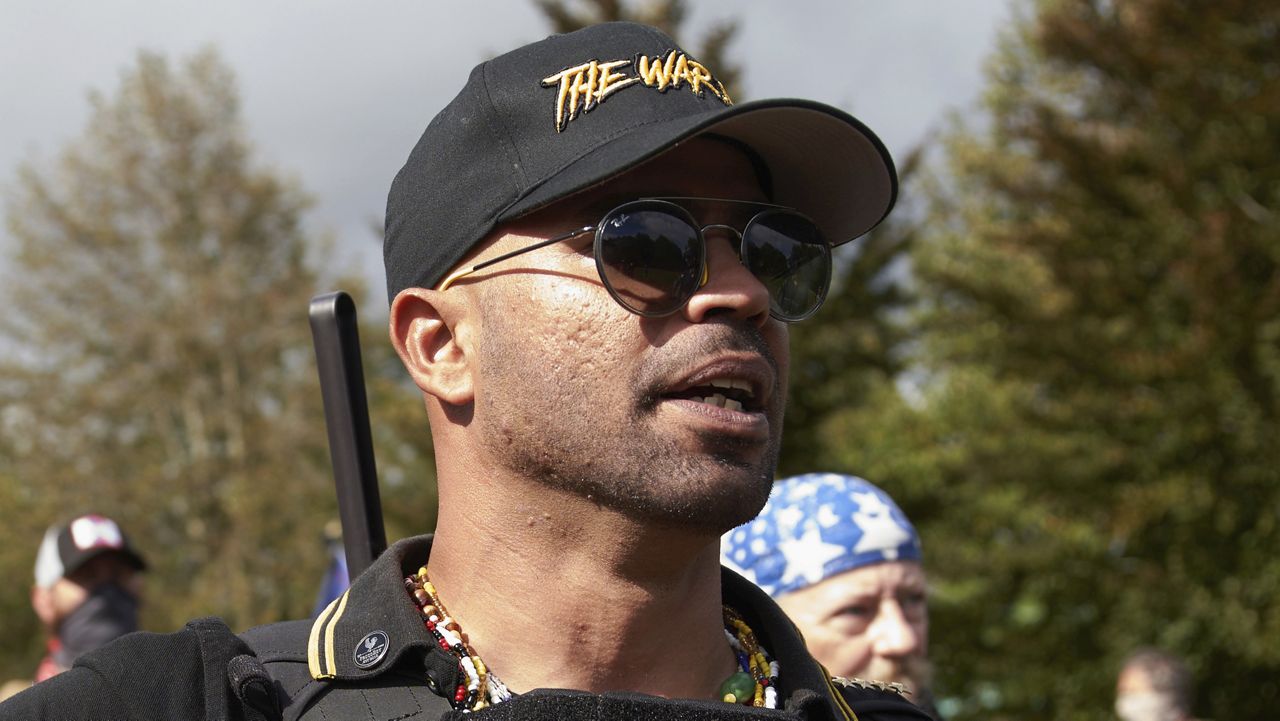Former Proud Boys leader Enrique Tarrio was sentenced Tuesday to 22 years in prison for orchestrating his far-right extremist group’s attack on the U.S. Capitol in a failed bid to stop the transfer of presidential power after Donald Trump lost the 2020 election.
Tarrio’s sentence is the longest so far among more than 1,100 Capitol riot cases, topping the 18-year sentences that Oath Keepers founder Stewart Rhodes and one-time Proud Boys leader Ethan Nordean both received after juries convicted them of seditious conspiracy and other charges.
It comes as the Justice Department prepares to put Trump on trial at the same courthouse in Washington on charges that the then-president illegally schemed to cling to power that he knew had been stripped away by voters.
What You Need To Know
- Former Proud Boys leader Enrique Tarrio has been sentenced to 22 years in prison for orchestrating a failed plot to keep Donald Trump in power after the Republican lost the 2020 presidential election
- Tuesday’s sentencing caps one of the most significant prosecutions over the Jan. 6 attack on the U.S. Capitol
- Tarrio’s sentence is the longest so far among more than 1,100 Capitol riot cases
- Oath Keepers founder Stewart Rhodes and former Proud Boys leader Ethan Nordean both received 18 years for their Jan. 6 convictions
- Prosecutors wanted 33 years for Tarrio, who was convicted of seditious conspiracy. The Miami resident’s lawyers deny the Proud Boys planned to attack the Capitol
- It comes as the Justice Department prepares to put Trump on trial at the same courthouse in Washington on charges that the then-president illegally schemed to cling to power that he knew had been stripped away by voters
The Tarrio case — and hundreds of others like it — function as a vivid reminder of the violent chaos fueled by Trump’s lies around the election and the extent to which his false claims helped inspire right-wing extremists who ultimately stormed the Capitol to thwart the peaceful transfer of presidential power.
Rising to speak before the sentence was handed down, Tarrio pleaded for leniency, describing Jan. 6 as a “national embarrassment,” and apologizing to the police officers who defended the Capitol and the lawmakers who fled in fear. His voice cracked as he expressed remorse for letting down his family and vowed that he is done with politics.
“I am not a political zealot. Inflicting harm or changing the results of the election was not my goal,” Tarrio said.
“Please show me mercy,” he said, adding, “I ask you that you not take my 40s from me.”
Prosecutors had sought 33 years behind bars for Tarrio, describing him as the ringleader of a plot to use violence to shatter the cornerstone of American democracy and overturn the election victory by Joe Biden, a Democrat, over Trump, the Republican incumbent.
“We need to make sure the consequences are abundantly clear to anyone who might be unhappy with the results of 2024, 2028, 2032 or any future election for as long as this case is remembered,” prosecutor Conor Mulroe said. “This was a calculated act of terrorism.”
Tarrio wasn’t in Washington, D.C, when Proud Boys members joined thousands of Trump supporters, who smashed windows, beat police officers and poured into the House and Senate chambers as lawmakers met to certify Biden’s victory. But prosecutors say the 39-year-old Miami resident organized and led the Proud Boys’ assault from afar, inspiring followers with his charisma and penchant for propaganda.
Tarrio had been arrested two days before the Capitol riot on charges that he defaced a Black Lives Matter banner during an earlier rally in the nation’s capital, and he had complied with a judge’s order to leave the city after his arrest.
U.S. District Judge Timothy Kelly, who was nominated to the bench by Trump, agreed with prosecutors that the Proud Boys’ crimes could be punished as “terrorism” — increasing the recommended sentence under federal guidelines. But he ultimately sentenced the Proud Boys to prison terms shorter than what prosecutors were seeking.
The backbone of the government’s case was hundreds of messages exchanged by Proud Boys in the days leading up to Jan. 6 that prosecutors say showed how the extremists saw themselves as revolutionaries and celebrated the Capitol attack, which sent lawmakers running into hiding.
As Proud Boys swarmed the Capitol, Tarrio cheered them on from afar, writing on social media: “Do what must be done.” In a Proud Boys encrypted group chat later that day someone asked what they should do next. Tarrio responded: “Do it again.”
“Make no mistake,” Tarrio wrote in another message. “We did this.”
Tarrio’s lawyers denied the Proud Boys had any plan to attack the Capitol or stop the certification of Biden’s victory. They argued that prosecutors used Tarrio as a scapegoat for Trump, who spoke at the “Stop the Steal” rally near the White House on Jan. 6 and urged his supporters to “fight like hell.”
Tarrio is the final Proud Boys leader convicted of seditious conspiracy to receive his punishment. Three fellow Proud Boys found guilty by a Washington jury of the rarely used sedition charge were sentenced to prison terms ranging from 15 to 18 years.
The Justice Department is appealing the 18-year prison sentence of Rhodes, the Oath Keepers founder, who was convicted of seditious conspiracy in a separate case, as well as the sentences of other members of his antigovernment militia group that were lighter than what prosecutors had sought. Prosecutors had requested 25 years in prison for Rhodes.



